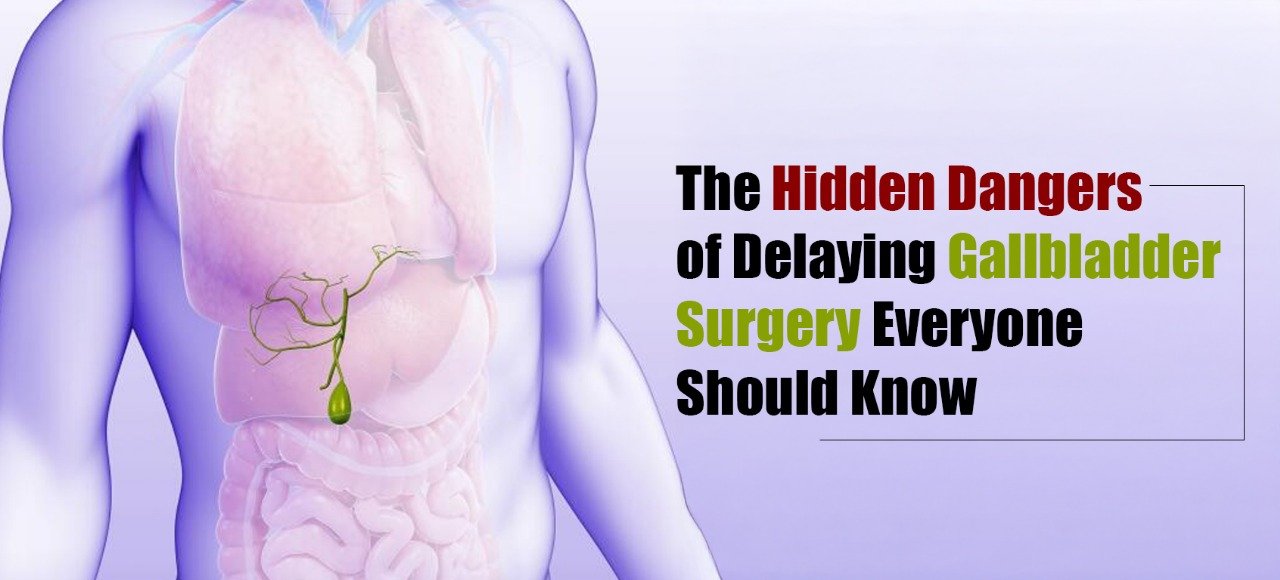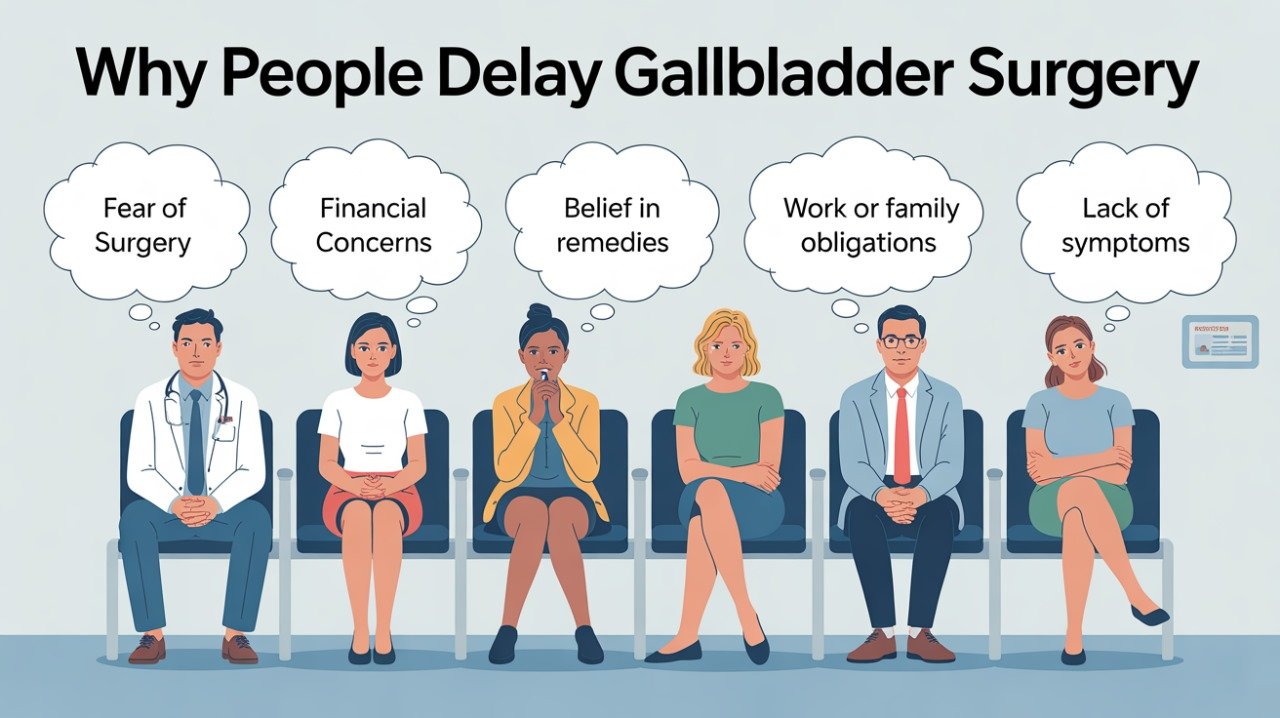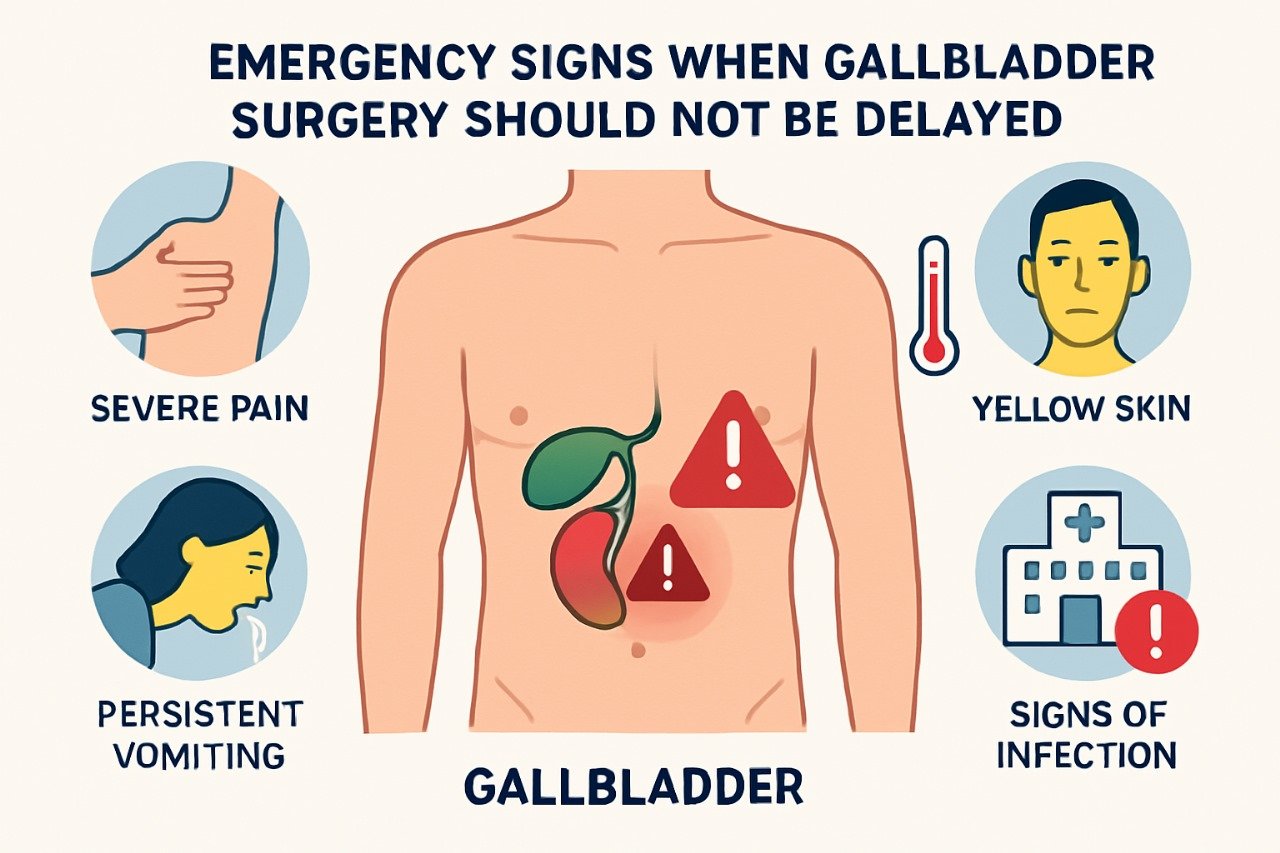

The Hidden Dangers of Delaying Gallbladder Surgery Everyone Should Know
At Jeevanshree Hospital, Dr. Rahul Mahadar often sees patients who waited too long to act on gallbladder symptoms. Many don’t realize the risks until they face an emergency. That’s why it’s crucial to understand The Hidden Dangers of Delaying Gallbladder Surgery Everyone Should Know and how timely care can protect your health, reduce pain, and prevent serious complications.
Your gallbladder stores bile to aid fat digestion. When stones or inflammation disrupt this system, surgery (cholecystectomy) is a safe, definitive solution. Delaying surgery may feel harmless if pain comes and goes, but each attack can worsen inflammation, raise infection risk, and complicate future treatment. Early evaluation helps you avoid emergencies and shortens recovery time.
Understanding Gallbladder Problems
Gallbladder issues commonly arise from gallstones blocking bile flow, leading to irritation, infection, or swelling. Triggers can include fatty meals, rapid weight loss, pregnancy, or metabolic changes. Over time, recurring blockage inflames the gallbladder and the bile ducts, increasing the risk of severe complications.
Typical symptoms include:
- Steady pain in the upper right abdomen or under the ribs (often after meals)
- Nausea, vomiting, bloating, and indigestion
- Back or shoulder pain, especially on the right side
- Fever or chills during an acute attack
Yellowing of the eyes/skin (jaundice) if ducts are blocked

Why People Delay Gallbladder Surgery
Many people delay because they hope symptoms will fade, fear anesthesia, or assume small stones are “not serious.” Others may be misdiagnosed with acidity or gas and continue to live with intermittent pain. Waiting can transform a manageable condition into an emergency—and emergency operations are typically tougher on the body.
If you’re comparing options and want a local expert opinion, consult a gastrointestinal surgeon in Thane to assess your symptoms and imaging promptly.
The Hidden Dangers of Delaying Gallbladder Surgery
1) Recurrent Gallbladder Attacks
Attacks tend to repeat and intensify. Pain episodes can last hours, disrupt sleep and work, and lead to dehydration from persistent vomiting. Frequent attacks also increase the likelihood of infection.
2) Gallbladder Inflammation (Cholecystitis)
Inflammation raises pressure inside the gallbladder, causing severe pain, fever, and tenderness. Untreated cholecystitis can progress to pus formation (empyema), tissue death (gangrene), or rupture—each requiring urgent surgery.
Many patients search for a Gastrointestinal Surgeon at Jupiter Hospital Thane when attacks escalate; wherever you seek care, urgent evaluation during severe pain is essential.
3) Blockage of Bile Ducts
Stones can slip into the common bile duct, blocking bile flow and causing jaundice, dark urine, pale stools, and intense itching. Prolonged blockage threatens liver function and can require additional procedures (like ERCP) before surgery.
If you’re aiming to find the best Gastrointestinal surgeon at Jupiter Hospital remember that advanced cases may require staged procedures—another reason to act early.
4) Pancreatitis (Life-Threatening Complication)
A small stone can obstruct the pancreatic duct, triggering pancreatitis—a painful, potentially life-threatening inflammation. Hospitalization, intensive monitoring, and procedures may follow. Preventing this scenario through timely surgery is far simpler and safer.
For complex biliary-pancreatic situations, patients sometimes consult a GI surgeon at Jupiter Hospital Thane but the best outcome always starts with early diagnosis.
5) Risk of Gallbladder Rupture or Gangrene
Delayed care can compromise blood flow to the gallbladder wall, leading to gangrene or rupture. Both conditions provoke widespread infection inside the abdomen (peritonitis), requiring emergency surgery and a longer, riskier recovery.
6) Increased Complexity of Surgery Later On
Frequent inflammation creates scar tissue and adhesions that make later surgery more difficult. This can increase operative time, conversion from laparoscopic to open surgery, and overall risks.
Advanced cases sometimes need specialized pathways similar to gastrointestinal surgery at Jupiter Hospital Thane which can involve duct clearance or drainage before removal—another reason not to delay.
When Should You Not Delay Gallbladder Surgery?

Seek urgent medical care if you experience:
- Persistent or worsening upper right abdominal pain
- Fever, chills, or severe tenderness
- Yellowing of eyes/skin (jaundice), dark urine, pale stools
- Repeated vomiting or inability to keep fluids down
AEO quick answers:
- Q: When should I go for gallbladder surgery?
A: Consider surgery when gallstones cause repeated pain, infection, jaundice, or digestion problems that interfere with daily life and immediately if you have fever, persistent pain, or yellowing of the eyes.
What Happens During Gallbladder Surgery?
Most patients undergo laparoscopic cholecystectomy—tiny incisions, a camera for guidance, and precise removal of the gallbladder. The procedure is routine, safe, and typically takes under an hour to a couple of hours, depending on complexity. Many people return home the same day or the next, with a short recovery and small scars.
If you’re evaluating hospital options and specialists, you may come across a gastro surgeon at Jupiter Hospital in your research; the key is selecting an experienced surgeon who explains your imaging, risks, and recovery clearly.
Recovery and Lifestyle After Surgery
You can usually walk the same day and return to light activities within a few days. Most patients resume regular routines in 1–2 weeks, depending on job demands. Start with easily digestible meals; gradually reintroduce fiber and healthy fats as tolerated. Without a gallbladder, bile flows continuously into the intestine—your body adapts, and digestion remains effective for most people.
Related Care at Jeevanshree
If you or a family member also needs hernia support, explore our service page: Abdominal Hernia Surgery in Dombivli.
You can also locate qualified professionals nearby here: Hernia Specialist in Dombivli.
Expert Advice: Don’t Ignore the Signs
As soon as gallbladder pain affects your daily life, don’t wait for the ‘next attack’ that next episode can be the one that turns into an emergency,” advises Dr. Rahul Mahadar at Jeevanshree Hospital. Early evaluation helps you avoid duct blockage, pancreatitis, and complex surgeries. For residents in Thane–Dombivli and nearby areas, timely consultation significantly reduces risk and improves recovery outcomes.
Conclusion: Early Action Can Save You from Serious Health Risks
Delaying gallbladder surgery increases the chance of recurrent attacks, infections, duct blockage, pancreatitis, and difficult operations. Laparoscopic surgery is safe, effective, and offers a quick return to normal life especially when done before complications set in. Don’t wait for symptoms to worsen. Book a consultation at Jeevanshree Hospital with Dr. Rahul Mahadar today to review your scan, discuss options, and plan a safe, timely recovery.


 Next Post
Next Post